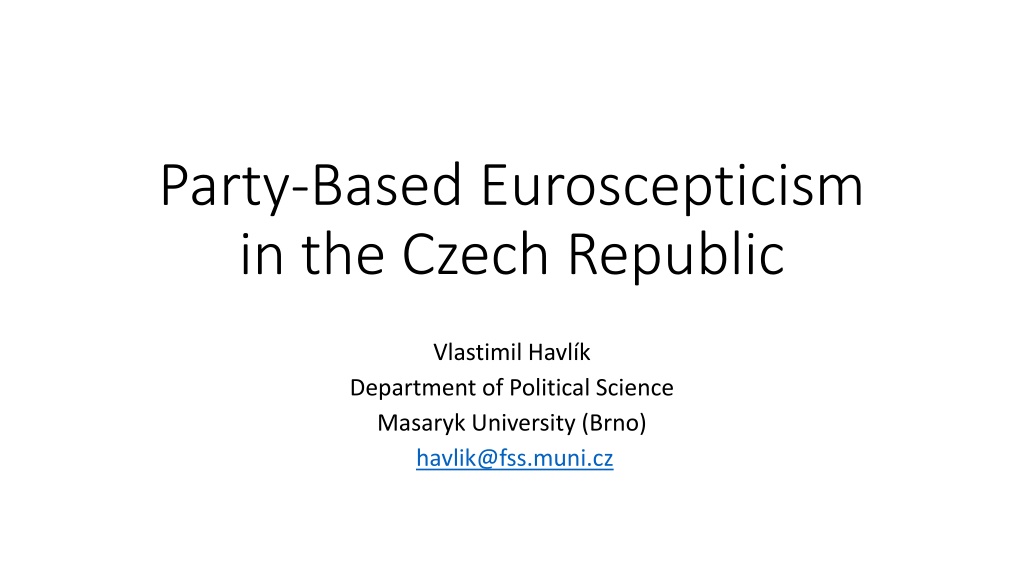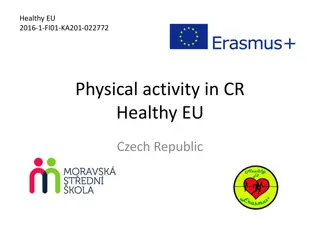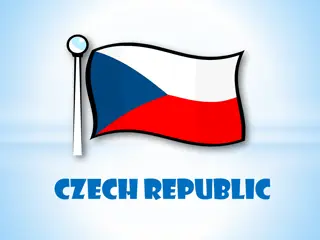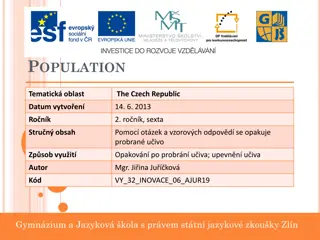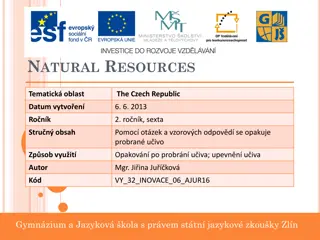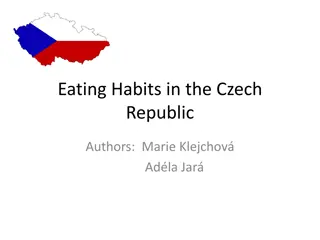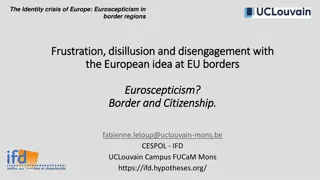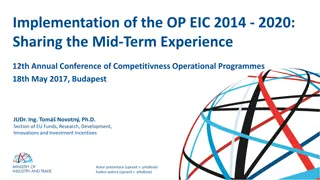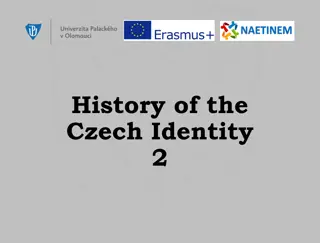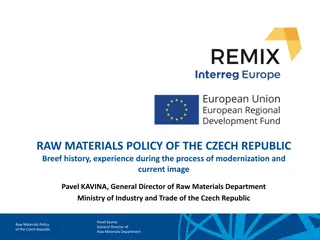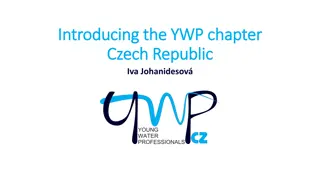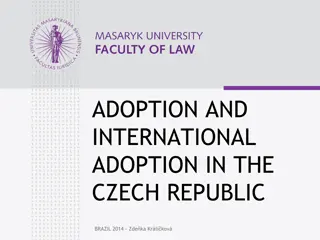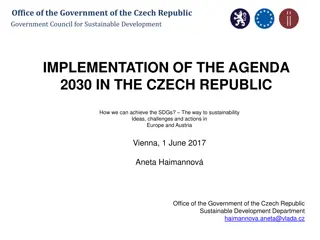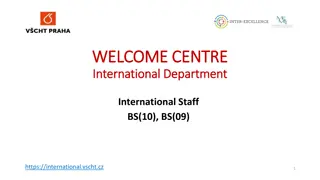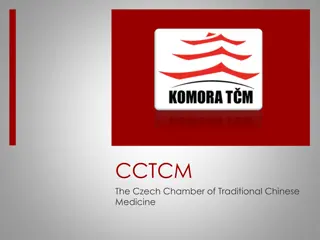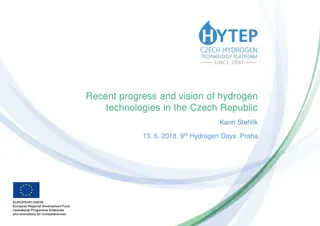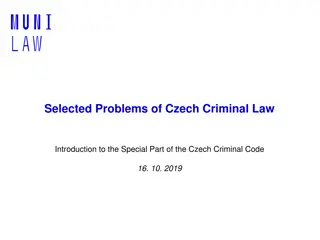Party-Based Euroscepticism in the Czech Republic
Analyzing the phenomenon of party-based Euroscepticism in the Czech Republic, this research delves into the Eurosceptic stances of various Czech political parties, their levels of Euroscepticism, and the implications of their positions. The study explores the context of party-based Euroscepticism within the stable Czech party system and investigates the emergence of new political parties in the country. It distinguishes between hard Euroscepticism and soft Euroscepticism, providing insights into the Czech public's attitudes towards European integration.
Download Presentation

Please find below an Image/Link to download the presentation.
The content on the website is provided AS IS for your information and personal use only. It may not be sold, licensed, or shared on other websites without obtaining consent from the author. Download presentation by click this link. If you encounter any issues during the download, it is possible that the publisher has removed the file from their server.
E N D
Presentation Transcript
Party-Based Euroscepticism in the Czech Republic Vlastimil Havl k Department of Political Science Masaryk University (Brno) havlik@fss.muni.cz
Outline Why the Czech Republic? Context Party-based Euroscepticism many faces but limited influence
Questions Q1: Which Czech political parties are Eurosceptic? (including concept of Euroscepticism) Q2: How (much) Eurosceptic are they? Q3: Does it matter?
Why the Czech Republic? Because of public Euroscepticism Adoption of Euro (April 2014) Surely yes DK Rather yes Surely not Rather not Source: CVVM
Why the Czech Republic? Because of many faces of party-based Euroscepticism
Context party system in the Czech Republic One of the most stable party systems in CEE 1996 2010: two main poles + several smaller parties Unidimensional competition (+ religious question) KS M SSD liberal centre (SZ, US) KDU- SL ODS
Election results (1996-2006) Others
Election results (1996 2013) Others
New political parties (2010 2013) (2010: 16.7 %) split from KDU- SL, conservative-liberal purifier of ODS Public Affairs - VV (2010: 10.9%) centrist populist party ANO 2011 (2013: 18.7%) centrist populist party Tomio Okamura`s Dawn of Direct Democracy svit (2013: 6.88%) (radical right-wing) populist party Party of Free Citizens (EP 2014 5.24%)
Euroscepticism Hard Euroscepticism: a principled opposition to the project of European integration as embodied in the EU, in other words, based on the ceding or transfer of powers to [a] supranational institution such as the EU. Soft Euroscepticism: not a principled objection to the European integration project of transferring powers to a supranational body such as the EU, but there is opposition to the EU's current or future planned trajectory based on the further extension of competencies that the EU is planning to make. (Szczerbiak and Taggart 2003: 12)
+ Source: author, based on CHES (2002-2014) -
Source: author, based on CHES
Civic Democratic Party Not against membership (2003 referendum) National/sovereingty based Euroscepticism opposing further integration, against the Lisbon Treaty Against: the federal superstate , strenghtening of EP and ECom., majority voting in the Council Proponents of economic integration (Common Market) but against Euro (sovereingty + economic arguments), current CAP back to the concept of free economic area (ODS 2014) Economically liberal arguments (againts allegedly socialist EU) preference of flexible integration Pragmatic perception of the membership an instrument to support the Czech economy Challenge of incumbency the Constitutional Treaty
Communist Party of Bohemia and Moravia Dilemma of socialist/communist internationalism Against capitalist, imperialist and right-wing EU of bureaucrats and financers, initially critical to the membership (2003 referendum) For more democratic, socialist integration and strenghtening of integration of the Eueopean left against the offensive of neoliberalism and sings of neofascism and neonacism (KS M 2014) We want to rebuild Europe on the basis of solidarity and sovereingty of the people, equality and cooperation (KS M 2014) A platform for socialist cooperation Internally divided (hardliners vs reformist/moderates) Socialization of MEPs of the party, softening of the Euroscepticism
Party of Free Citizens (neo)liberal frames of Euroscepticism freedom as the main principle (with national soveregeinty) Rejection of the Lisbon Treaty the Union of Nations as an alternative the European Union has to change into into a community of sovereign democratic nations, voluntarily collaborating on the basis of equality Initially soft Euroscepticism, but gradually serious doubts about the membership, rejection of the current trajectory of the integration project a case of a hard Eurosceptic party (?)
Dawn of Direct Democracy Not too much focused on the EU Selective/non-systemic policy-based Euroscepticism immigration policy X security and defence policy, internal market Eurosceptic frames populism (sovereignty of the people, bureaucracy, corruption) Conditional acceptance of Euro (referendum) Sovereingty based arguments we are against weakening of the competencies of the Czech Republic, we do not agree with transformation of national states into provinces with limited powers, we do not want to be the slaves of the European Union. ( svit 2014)
Summary a paradise for Euroscepticism research Electorally successful Eurosceptic parties Varieties and different intensity of party based Euroscepticism Driven by the primary ideologies of the parties Dynamics of Eurosceptic stances But does Euroscepticism matter for Czech party politics?
US KDU-CSL SSD TOP09 ODS KS M
US KDU-CSL SSD TOP09 ODS KS M
US KDU-CSL SSD TOP09 ODS KS M
Does the EU issue matter? Interactions between parties The 2002 elections and the formation of the pro-European cabinet of SSD KDU- SL US X 2006 and 2010 cabinets (ODS X KDU, SZ and TOP 09) Potential impact on volatility (party voters congruence) The crucial role of the salience of the issue low in a longterm perspective
Conclusion Electorally succesful Eurosceptic parties a variety of Euroscepticisms The role of the primary ideologies of the parties from left wing, neoliberal to nationalist Euroscepticism Euroscepticism as established sets of ideas (the 2013 election) BUT limited impact on electoral competition
